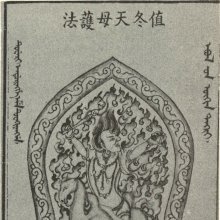Hemanta, Hemamta: 27 definitions
Introduction:
Hemanta means something in Hinduism, Sanskrit, Jainism, Prakrit, Buddhism, Pali, Marathi, Hindi, biology. If you want to know the exact meaning, history, etymology or English translation of this term then check out the descriptions on this page. Add your comment or reference to a book if you want to contribute to this summary article.
Hemanta has 27 English definitions available.
Images (photo gallery)
Languages of India and abroad
Sanskrit dictionary
[Deutsch Wörterbuch]
Source: Cologne Digital Sanskrit Dictionaries: Böhtlingk and Roth Grosses Petersburger WörterbuchHemanta (हेमन्त):—(zu hima) [Uṇādisūtra 3, 129.] m. Winter [Amarakoṣa 1, 1, 3, 18.] [Hemacandra’s Abhidhānacintāmaṇi 156.] [Halāyudha 1, 113.] [Ṛgveda 10, 161, 4.] [Atharvavedasaṃhitā 6, 55, 2. 8, 2, 22. 12, 1, 36.] [Vājasaneyisaṃhitā 13, 58.] anta ṛtūnām [The Śatapathabrāhmaṇa 1, 5, 3, 13. fg. 2, 2, 3, 8.] [Pañcaviṃśabrāhmaṇa 21, 15, 2.] nidhana des Jahres [Ṣaḍviṃśabrāhmaṇa 3, 1.] [Chāndogyopaniṣad 2, 5, 1.] [Taittirīyabrāhmaṇa 1, 4, 10, 10.] grīṣmaḥ, varṣāḥ, hemantaḥ [Taittirīyasaṃhitā 5, 7, 2, 4.] [The Śatapathabrāhmaṇa 8, 5, 2, 10.] grīṣmahemantau [1, 5, 3, 12.] hemantaśiśirau [Pāṇini’s acht Bücher 2, 4, 28] (m. angeblich nur ved.). pañcartavo hemantaśiśirayoḥ samāsena [Aitareyabrāhmaṇa 1, 1.] [Taittirīyasaṃhitā 1, 6, 2, 3.] [The Śatapathabrāhmaṇa 10, 4, 5, 2.] [ĀŚV. GṚHY. 2, 4, 1.] [Rājataraṅgiṇī 4, 401.] [WILSON, Sel. Works 2, 181.] sahaḥsahasyau hemantaḥ [Suśruta.1,19,10. 135,12.] [MAITRYUP.6,33.] [Manu’s Gesetzbuch.3,281.6,23.] [Mahābhārata 12,9291.] [Rāmāyaṇa.1,43,14] [?(44,11 Gorresio).3,22,1. Spr. (II) 6385. 7417. Varāhamihira’s Bṛhajjātaka S.3,24. 26. 46,69. 93. 86,28. Brahmapurāṇa in Lassen’s Anthologie (III) 49,16. Kathāsaritsāgara 30,31. Rājataraṅgiṇī.6,298. Bhāgavatapurāṇa.7,14,21. Oxforder Handschriften 97,b,29. 123,b,1. BURNOUF, Intr. 569.] hemantānte [Mahābhārata 5, 7154.] samaye [Pañcatantra 93, 1.] megha [94, 2.] hemantānila [Rājataraṅgiṇī 3, 172.] — f. hemantī [UJJVAL.] Vgl. su und haimanta fg.
Sanskrit, also spelled संस्कृतम् (saṃskṛtam), is an ancient language of India commonly seen as the grandmother of the Indo-European language family (even English!). Closely allied with Prakrit and Pali, Sanskrit is more exhaustive in both grammar and terms and has the most extensive collection of literature in the world, greatly surpassing its sister-languages Greek and Latin.
See also (Relevant definitions)
Starts with: Hemamta-siri, Hemanta-ritu, Hemantaharita, Hemantajabdha, Hemantamegha, Hemantanatha, Hemantanila, Hemantanta, Hemantaparvata, Hemantapratyavarohana, Hemantaritu, Hemantarituvarnana, Hemantasamaya, Hemantashishira, Hemantasimha, Hemantavajri.
Ends with: Aparahemanta, Grishmahemanta, Khemanta, Suhemanta.
Full-text (+89): Haimanta, Hemantanatha, Ritu, Aparahemanta, Hemantika, Haimana, Pausha, Hemantamegha, Emantam, Hemantasamaya, Hemantapratyavarohana, Hemantarituvarnana, Hemantasimha, Hemantajabdha, Shishira, Hemant, Hemantashishira, Haimala, Jabdha, Hemantaparvata.
Relevant text
Search found 50 books and stories containing Hemanta, Hemamta, Hēmaṃta, Hemaṃta, Hēmanta; (plurals include: Hemantas, Hemamtas, Hēmaṃtas, Hemaṃtas, Hēmantas). You can also click to the full overview containing English textual excerpts. Below are direct links for the most relevant articles:
Vakyapadiya of Bhartrihari (by K. A. Subramania Iyer)
Verse 3.14.301 < [Book 3 - Pada-kāṇḍa (14): Vṛtti-samuddeśa (On Ccomplex Formation)]
Verse 3.14.315 < [Book 3 - Pada-kāṇḍa (14): Vṛtti-samuddeśa (On Ccomplex Formation)]
Verse 3.14.304 < [Book 3 - Pada-kāṇḍa (14): Vṛtti-samuddeśa (On Ccomplex Formation)]
Jivanandana of Anandaraya Makhin (Study) (by G. D. Jayalakshmi)
Seasons and Diseases < [Chapter 4 - Āyurvedic principles in Jīvanandana Nāṭaka]
Kavyamimamsa of Rajasekhara (Study) (by Debabrata Barai)
Part 8.8 - Region of Madhyadeśa (central part) < [Chapter 5 - Analyasis and Interpretations of the Kāvyamīmāṃsā]
Part 8.11 - Characteristics of Hementa-kāla (dewy season) < [Chapter 5 - Analyasis and Interpretations of the Kāvyamīmāṃsā]
Part 8.12 - Characteristics of Śiśira-kāla (winter season) < [Chapter 5 - Analyasis and Interpretations of the Kāvyamīmāṃsā]
Vishnudharmottara Purana (Art and Architecture) (by Bhagyashree Sarma)
7(c): Natural Objects and Phenomenon in Painting < [Chapter 5 - Painting and Image Making]
Chandogya Upanishad (Madhva commentary) (by Srisa Chandra Vasu)
Sushruta Samhita, volume 1: Sutrasthana (by Kaviraj Kunja Lal Bhishagratna)
Related products
